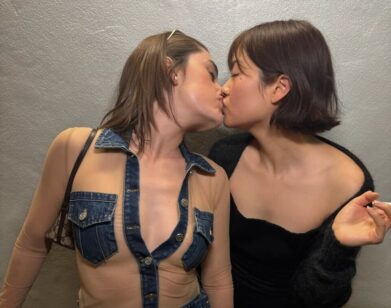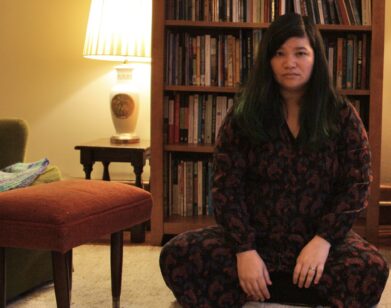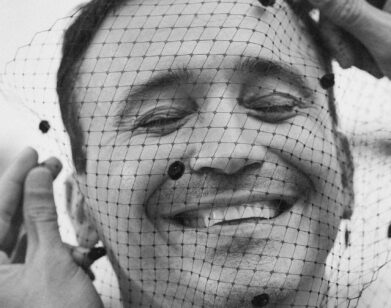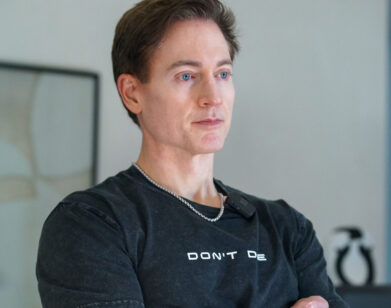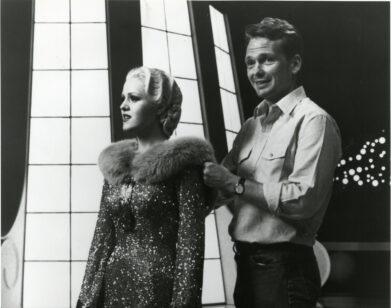Superhero and the City
ABOVE: KRYSTEN RITTER AS JESSICA JONES IN MARVEL’S JESSICA JONES. PHOTO COURTESY OF NETFLIX/MYLES ARONOWITZ.
It’s hard to imagine Jessica Jones existing in the same world as the Avengers. Superhuman strength aside, Netflix’s Marvel’s Jessica Jones seems far more grounded in reality. Created by Melissa Rosenberg, the show is shot in New York, and Vazac’s Horseshoe Bar, which stands in for the bar where Jones’ love interest Luke Cage (Mike Colter) works and has appeared in everything from The Godfather II to Crocodile Dundee and Blue Bloods. There are no shiny costumes (though many jokes about shiny costumes), and Jones’ arch nemesis Kilgrave (David Tennant) is a sociopathic stalker (albeit one who just happens to be a better manipulator than most).
“Jessica feels that way too,” says Krysten Ritter, who plays Jones in the show. “There’s one reference to other ‘gifted’ people, and she’s like, ‘Leave me out of it. I have nothing to do with that. I wasn’t there.’ She’s kind of a removed misfit in terms of the other Marvel superheroes.”
As of Friday, all 13 episodes of Jessica Jones’ debut season are now on Netflix. The reviews are unanimously positive, and a sequel series involving Jones, Cage, and Daredevil, The Defenders, has already been greenlit. “I did watch a few episodes this morning,” Ritter admits. “I’m having my friends over and my acting teacher later, so I’m trying to hold off until 5:30, but I was in the other room watching it on my headphones. It was so exciting.”
Now 34, Jones is hardly Ritter’s first cult-television hit. Since trading in modeling for acting in the early 2000s, Ritter has appeared in Veronica Mars, Gilmore Girls, Breaking Bad, and the short-lived though much loved Don’t Trust the B—- in Apartment 23.
EMMA BROWN: What did the Jessica Jones script look like when you first saw it? I know they were very secretive about what it was.
KRYSTEN RITTER: I first auditioned with just a set of dummy sides. Then I had a meeting with Melissa Rosenberg and Jeph Loeb. I sat in the Marvel offices and read the first two scripts and they were fantastic. Jessica Jones was on every single page. She was really vulnerable at times and sarcastic and funny and traumatized and strong and walking around looking cool. And I was like, “Oh my god, this is a real part.” I wanted the part so badly after I read it.
BROWN: Melissa has said you were always at the top of her list to play the part.
RITTER: I learnt that recently through interviews I’ve done with Melissa, but I certainly didn’t know that at the time. I got a call to come in and audition—the good old-fashioned way you get jobs. It was nothing too fancy. They didn’t offer it to me; I had to screen test a lot and audition after audition. Now, talking to Melissa and hearing I was always the top choice is really exciting, but I certainly did not know that then.
BROWN: What sort of notes or feedback did they give you in the early auditions for the character of Jessica Jones? Did they tell you to try anything differently?
RITTER: No. It was sort of different rounds—the first time it had one or two scenes, and then they called me back to see an additional scene and then they called me back to read with Mike Colter. So each one was jumping over another hurdle.
BROWN: You’ve said in the past that one of the reasons you agreed to do the audition even though you didn’t think you were going to get the role was that you like to audition. Is that true?
RITTER: Yeah, for the most part I do. Not just for the sake of auditioning; I like to audition for good projects because if it’s a good project, it’s an opportunity to get in front of a casting director, to get in front of, in this case, Netflix, which is a network that I really wanted to be in business with. If it’s a good audition, whether or not I think I’m going to get the part, I do always say yes to going.
BROWN: Do you remember your first-ever professional audition?
RITTER: I do. My first audition was for a Dr. Pepper commercial. It was a very long time ago —15 years ago. I went in and they asked me a bunch of questions. I told a few jokes and made a total fool of myself and was very goofy, and I ended up getting the commercial. That was my first audition. I got cut out of the commercial, however.
BROWN: Did they tell you before it aired?
RITTER: I think typically they tell you because that’s how they base your payment, if you’re in the commercial or not, so I think I knew.
BROWN: I heard that you like to do a lot of prep work.
RITTER: Yes. I rely totally on prep work. The second I got the part I was like, “Give me the script, give me the script.” I wanted to get to work right away. It’s about, for me, doing as much work ahead of time. That way I can be free on set and confident. When you prepare for something, you can then play around; you’re not as worried about remembering your lines because you already know them so well. That’s where you can find the freedom. So I’m all about prep work. Because Jessica has been through so much in her past, she’s so informed by what happened to her and the trauma that she dealt with with Kilgrave and with other things. It was really about creating that life that happened before so everything you do is coming from that place.
BROWN: Did you ever receive a script that upset the backstory you created?
RITTER: No, because the great thing about Mel was we had a very open dialogue about Jessica’s past. Anything I needed, I had access to in terms of what informed her. Mel wouldn’t necessarily tell me what was coming down the line, but I felt like I had all the tools I needed to play her.
BROWN: Did you ever have a question for Mel that she couldn’t answer?
RITTER: Never, because that women, she has the answer to everything. She’s been working on this for such a long time and I think some of the best ideas are those that have been kicking around for a long time. She knows this character inside and out, so she was a great asset and ally and all-around amazing woman.
BROWN: How did you go about researching Jessica’s PTSD?
RITTER: That’s hours and hours with my acting teacher and really trying to understand the psychology of what she’s going through. The thing with PTSD, it’s not just a memory; you feel like it’s actually happening to you again, so it was really about building how all of the things affecting her felt in the moment and being able to access them. This comes from hours and hours and days and days every day with my acting teacher.
BROWN: When did you first get an acting teacher?
RITTER: I’ve been working with the same acting teacher, Marjorie Ballentine, for 10 years. I coach with her on everything. She sometimes even helps me if I’m considering doing a project—I’ll flip it to her and see what she thinks. She is somebody I rely on really heavily. She’s wildly talented and passionate. She makes me a better actor.
BROWN: What made you decide to go to Marjorie in the first place?
RITTER: Even before Marjorie, I was always taking classes and had coaches in New York. When I got to L.A. the first time, when I was just schlepping around and booking jobs early on, I needed something new, so I was referred to her by somebody and immediately was like, “Oh, this is my woman. Here she is. I’ve found her.” She’s an amazing mentor and I love how she works. She was trained by Stella Adler so she always works with actions and big ideas and fitting things in social perspective, which helps me get the script off of myself and look at things more as a whole and how my role affects the bigger story, whether it’s Jessica Jones or a small part in something else. She’s always pushing me to be better and find more things. If I have something I feel I have a really good handle on, I’ll go through and make my choices, and then I show it to her and work with her and she’ll find even more colors and even more things that I missed. That’s the benefit of having another set of eyes that really understands how to break things down.
BROWN: Have you had anyone come up to you in a public place about Jessica?
RITTER: Yes. Right when the trailer came out, I got that. And I was like, “Holy shit, the show isn’t even out yet!” It’s really exciting. Netflix is a huge platform and a lot of people have access to it. You always want your work to be seen as long as it’s good, right?
SEASON ONE OF MARVEL’S JESSICA JONES IS NOW AVAILABLE VIA NETFLIX.


